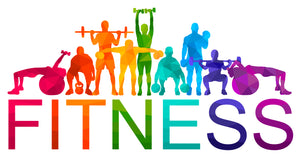Benefits of Aerobic Exercises

Different types of physical exercises serve different purposes.
Our bodies love to move, and they respond to movement in a variety of ways. For example, resistance training is great for gaining muscle strength, swimming and running challenges our endurance, and yoga is ideal for improving flexibility and self-awareness. A type of exercise that has been popular for decades is aerobic exercise training, also commonly referred to as “cardio.”
Originating from Greek terminology aero(air) + bios(life), aerobic means requiring free oxygen for life. Aerobic exercises refer to light-moderate intensity exercises that use oxygen to meet energy demands during the exercise.
Common aerobic exercises include walking, swimming, jogging, cycling, or dancing, and can be accomplished with gym equipment like treadmills, bikes, and elliptical machines, or without any equipment, like jogging outside or swimming.
It's no surprise that aerobic exercise has remained popular - some potential benefits of aerobic/cardio exercise are:

-
Heart*: As the name suggests, Cardio/Aerobic exercise plays an important role in strengthening our heart muscles by improving blood flow to the heart and reducing the resting heart rate. It also reduces the risk of heart disease by increasing the levels of HDL cholesterol (good cholesterol) and reducing the levels of triglycerides, thus reducing the risk of clogged arteries and plaque formation. [1][2]*

-
Muscles and Oxygen transport*: Aerobic exercises, as mentioned above, are oxygen-requiring exercises. The energy demands generated during aerobic exercises help to strengthen our muscles and facilitate the flow of air. This type of movement also helps in transporting oxygen throughout the body because of increased blood circulation. [3]*
-
Cognition*: With the release of endorphins (the feel-good chemicals), aerobic exercise can help us feel cheerful and energetic throughout the whole day, avoiding energy dips and mood swings. With regular endorphin boosting by aerobic exercise, we can reduce stress, improve cognition, and increase productivity. [4]*

-
Blood-sugar*: Aerobic exercises can be a boon for type-2 diabetic patients. They help increase insulin response and maintain blood sugar levels by lowering Hb A1C levels. [5]*
-
Immune system*: Responsible for boosting our immune system, aerobic exercises help us fight germs thus protecting us from minor illnesses such as cold and flu. [6]

From strengthening your heart to improving your mood, aerobic exercises do it all.* Get started today!*
* These statements have not been evaluated by the Food and Drug Administration. These products are not intended to diagnose, treat, cure, or prevent any disease.
References:
-
Snoek, J. A., Van Berkel, S., Van Meeteren, N., Backx, F. J., & Daanen, H. A. (2013). Effect of aerobic training on heart rate recovery in patients with established heart disease; a systematic review. PloS one, 8(12), e83907.
-
Lee, S., Deldin, A. R., White, D., Kim, Y., Libman, I., Rivera-Vega, M., ... & Arslanian, S. (2013). Aerobic exercise but not resistance exercise reduces intrahepatic lipid content and visceral fat and improves insulin sensitivity in obese adolescent girls: a randomized controlled trial. American journal of physiology-endocrinology and metabolism, 305(10), E1222.
-
Denison, H. J., Syddall, H. E., Dodds, R., Martin, H. J., Finucane, F. M., Griffin, S. J., ... & Aihie Sayer, A. (2013). Effects of Aerobic Exercise on Muscle Strength and Physical Performance in Community‐dwelling Older People from the Hertfordshire Cohort Study: A Randomized Controlled Trial. Journal of the American Geriatrics Society, 61(6), 1034-1036.
-
Erickson, K. I., & Kramer, A. F. (2009). Aerobic exercise effects on cognitive and neural plasticity in older adults. British journal of sports medicine, 43(1), 22-24.
-
Ezema, C. I., Onwunali, A. A., Lamina, S., Ezugwu, U. A., Amaeze, A. A., & Nwankwo, M. J. (2014). Blood glucose response to aerobic exercise training programme among patients with type 2 diabetes mellitus at the University of Nigeria Teaching Hospital, Enugu South-East, Nigeria. Sahel Medical Journal, 17(2), 54.
-
Woods, J. A., Ceddia, M. A., Wolters, B. W., Evans, J. K., Lu, Q., & McAuley, E. (1999). Effects of 6 months of moderate aerobic exercise training on immune function in the elderly. Mechanisms of ageing and development, 109(1), 1-19.
* These statements have not been evaluated by the Food and Drug Administration. These products are not intended to diagnose, treat, cure, or prevent any disease.




